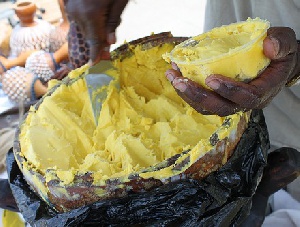Export earnings from shea butter products last year reached US$64 million, up from US$52 million in 2014, a 23 percent growth over the previous year, according to the latest figures from the Ghana Export Promotion Authority (GEPA).
In 2014, the sector recorded a growth rate of about 100 percent in export earnings when it increased from US$26 million in 2013 to US$52million in 2014. In the past five years, shea has been part of the top ten leading Non-Traditional export products from the country.
Within the agriculture sub-sector for instance, shea nuts was the second highest export earner with US$34 million in 2015 behind cashew nuts.
Despite the importance of shea to the country exports, many shea tree growing communities in the Upper East Region still believe that it is a taboo to plant the cash tree.
“The people believe that if you plant a shea tree and it starts to bear fruit you will die. Most of the old trees are dying and they are not being replaced because of this belief that the people hold,” Lucy A. Akanboyuure, a gender activist, championing women empowerment in the Kassena-Nankana West District of the Upper East Region told the B&FT.
She explained that the situation poses a threat to livelihood in the area, particularly women who have long been collecting and processing shea nuts into shea butter for ages.
The shea industry in northern Ghana is mainly centered on women. Approximately 16 million rural women in Africa contribute to their livelihoods and support their family and children's education by collecting, processing, and selling shea kernels and butter for local consumption or export.
In spite of the fact that women do not own shea farms, shea butter has been traditionally extracted by women from the dried kernels of the shea tree for many years.
This notwithstanding, shea farmers in the country say the absence of any form of support and effort by government to grow the sector is seriously affecting their activities.
“We have never received any form of support from anywhere to help us increase our yield. We need roads, especially bridges because when it rains we are unable to cross the many water bodies to our farms and it is when it rains that the reaped fruits fall off. So when this happens, animals usually eat up the fruits which is not good for us,” said Akurigo Samuel, whose family operates a large shea farm located in a town called Kandiga in the Kassena-Nankana District of the Upper East Region.
The sector, just like many others in the country is not streamlined and the cash tree still continue to suffer from bad farming practices and cultural beliefs.
Annually, bush fires resulting from bad farming practices destroy many hectares of shea farms in shea growing communities in the three northern regions. The tree is also battling deforestation as more and more people are moving to settle on lands where the plants used to grow.
“Much needs to be done for the sector because a lot of women’s livelihood and their families is at stake. Yields are decreasing yearly because old trees are not getting replaced and things can’t continue like this. NGOs are doing their best but the government also need to turn its attention to the sector,” Mrs. Akanboyuure added.
Business News of Friday, 23 September 2016
Source: B&FT













